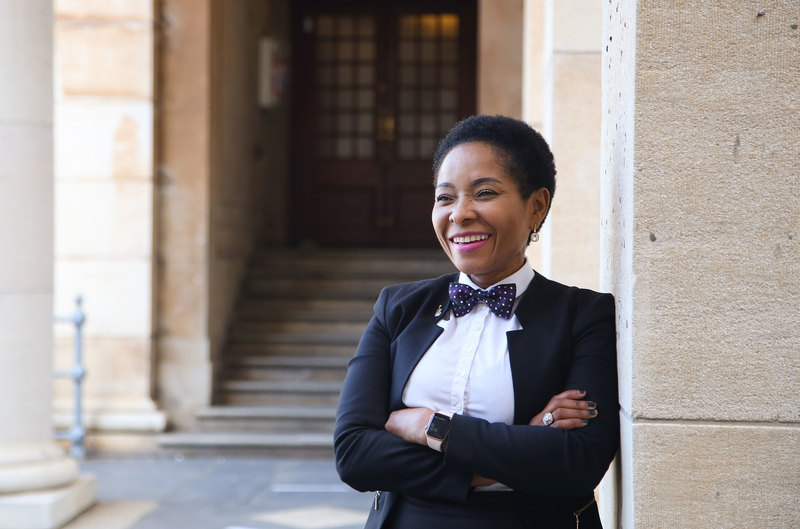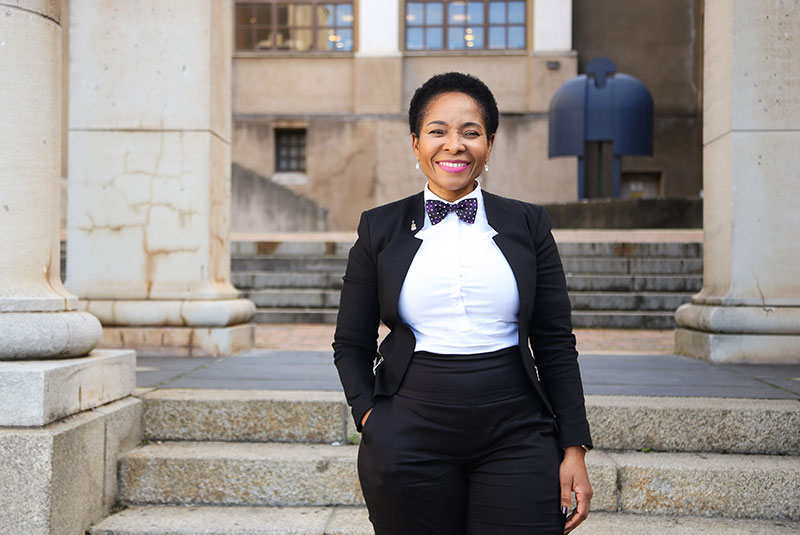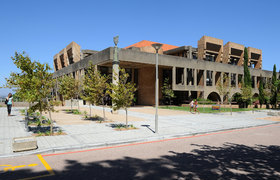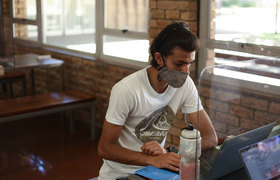VC addresses res students on developing social and professional skills
03 August 2021 | Story Nicole Forrest. Photos Je’nine May. Read time 5 min.
On 29 July, Vice‑Chancellor (VC) Professor Mamokgethi Phakeng joined students from the University of Cape Town’s (UCT) residences at the monthly Residence Academic Development Committee (RADC) webinar.
The RADC webinars aim to foster success for students living in university housing. The topic for this webinar was developing academic and professional relationships within and beyond university life.
The RADC works to bridge the gap between the various faculties and residences by promoting academic development within the learning and living spaces at UCT. By providing in‑depth personal and academic development insights, the committee aims to support academic success, increase student retention and provide members of the student body with a greater sense of belonging.
Logistics coordinator of the RADC, Tendai Mbanje, pointed out that this month’s webinar was aimed at encouraging students to reflect on their social and professional development in an academic setting.
“Social and professional growth are equally important to us, and it is now generally agreed that a degree is not enough for a successful career,” he said.
“Students have begun opening up about their needs and experiences both within the higher education system and post university. There is a lack of adequate mentorship to develop social and professional skills in academic settings, and we are filling this vacuum.”
The opportunity to explore
Professor Phakeng kicked off the webinar with a quintessentially bold approach to the topic: “When I was asked to talk about academic and professional development, with insights on developing relationships within and beyond university life, I thought, ‘What can I talk about?’
“My first thought for a topic – and it’s what we’re going to speak about tonight – was: Welcome to university. Choose your kind of corruption,” said Phakeng.
Aware that this statement may be perceived as peculiar, the VC went on to provide context.
“Whatever happens at university, you are going to be corrupted, but you decide which kind of corruption to choose. Every one of you will leave this university different to how [you arrived]. Some will leave with degrees. Some will leave with a huge network. Some will leave with a business. Some will leave with a relationship. Everything is on offer,” she said.

Phakeng emphasised that the beauty of the university system is in the opportunities it provides to explore oneself and the broader world. This, she highlighted, is the greatest luxury afforded to students.
“You don’t get this kind of opportunity – at this age or any other age – anywhere else. It’s very likely that this will be the only time in your life when you will spend a significant length of time in the same space as people who are your age, but who are all from different backgrounds; different communities; different lifestyles, religious beliefs, languages, customs; different tastes in art, music, food and clothes.
“It is the best opportunity that most of us will ever have to explore the different ways that human beings can think and be and act out who we are. You have the luxury of building the most powerful network ever, the luxury of exploring different outlooks of life, the luxury of hearing different opinions,” she added.
In addition to it being a privilege and a chance to engage with others, Phakeng pointed out that this type of exploration is also a survival strategy.
“When you take steps to network with different people, you are planting seeds of potential.”
“When you take steps to network with different people, you are planting seeds of potential, because the people around you at university will be the top professionals one day. Imagine how interesting and useful it will be later in life to have a top lawyer, a CEO of a multinational corporation and an award‑winning film director in your network,” she said.
The VC added that there is danger in only spending time with those who think and behave as you do and that by avoiding those who are different, you risk limiting your growth.
“You will not just be growing your social network, you’ll also be growing yourself because when you commit to engaging with diverse voices, you will begin to see the world and your place in it differently.”
Broadening horizons
While interacting with a diverse group of people provides the opportunity to develop flexibility of thought and reasoning, Phakeng said, this paradigm shift can be challenging.
“Some people think that exploring different ideas will corrupt us in a bad way, because we will begin to think differently from our parents and grandparents. These people adopt the kind of social activism that says, ‘We should all stick to our tribe’.
“But here’s the thing about learning: learning about a different point of view doesn’t mean you have to change; it simply means you have a wider set of choices and new options you didn’t know were available to you,” she explained.
“You can’t wait for the world to invite you to do something; you have to do it yourself.”
Phakeng shared how her own experience with “being corrupted” opened her up to achieving greater success, and set her on the path to becoming UCT’s VC.
“As a Motswana woman, I had been taught not to promote myself; not to look people in the eye. In my culture, you never talk about what you know or your skills; you wait for others to do that for you.
“At university though, if you want grants or help with your studies, or to win an award, you have to write an application letter that motivates why you deserve that. So, I wasn’t comfortable with that idea, but I was doing my master’s, and my friend who came from a different cultural background from me used the metaphor of a bodybuilder who goes to a bodybuilding competition and says, ‘I can’t show my six pack’. Will they ever win? No.
“And that’s when it clicked for me. It’s a bodybuilding competition, and you have got to show your ‘six pack’. You can’t wait for the world to invite you to do something; you have to do it yourself,” she said.
For Phakeng, that was the turning point that led to a string of successes and achievements.
“I learned and got corrupted. The idea of not looking people in the eye? Out the window. The idea of waiting for people to ask me about my achievements? Out the window. And it took time, but I got there, and I got a lot of awards along the way.”
Quote the human story
In conclusion, Phakeng drew on the words of Chimamanda Ngozi Adichie from the recent VC’s Open Lecture to drive home the need for self-exploration and for exploring the world.
“[Chimamanda] said, ‘We often try to make sense of the world by expecting life to fit our theories’. Her advice to us was to ‘quote the human story’. In other words, learn to relate to people who are different to you by listening to their stories rather than dehumanising them by expecting them to behave according to predetermined expectations.”
“Learn to relate to people who are different to you by listening to their stories.”
This, the VC noted, provides the opportunity for the growth that is needed for personal, academic and professional development.
“Hearing these stories, we unleash human potential and make room for humanity to grow, and to grow in new ways. When we welcome different ideas and opinions, and listen to them, examine them, respond to them intelligently, we allow these ideas to help us see the world differently.
“That is an important part of your education here at university, and it’s a luxury I hope you will make a part of your life – not only at university, but also as you develop personally and professionally.”
 This work is licensed under a Creative Commons Attribution-NoDerivatives 4.0 International License.
This work is licensed under a Creative Commons Attribution-NoDerivatives 4.0 International License.
Please view the republishing articles page for more information.










